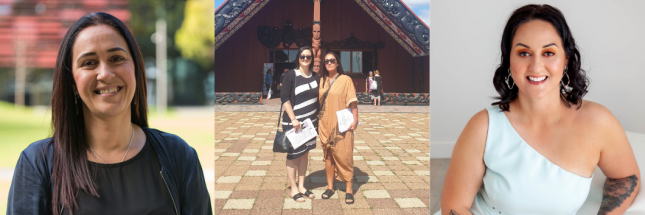-
Māori Midwives on the Power of Indigenous Birthing Practices
December 18, 2020 By Sara Matthews Camille Harris, Registered Māori Midwife, is unapologetic about her decision to study midwifery and practice exclusively with Māori families, in this week’s Friday Podcast. “It was always to serve my people,” she said. Both Harris and her professional partner, Registered Māori Midwife, Waimaire Onekawa, started their midwifery careers later in life with a clear dedication to Māori women in New Zealand. “And we just want to be able to give women—Māori women—and whanau [family], the love and care that we would hope to receive if we were the people being the recipients,” said Onekawa.
Camille Harris, Registered Māori Midwife, is unapologetic about her decision to study midwifery and practice exclusively with Māori families, in this week’s Friday Podcast. “It was always to serve my people,” she said. Both Harris and her professional partner, Registered Māori Midwife, Waimaire Onekawa, started their midwifery careers later in life with a clear dedication to Māori women in New Zealand. “And we just want to be able to give women—Māori women—and whanau [family], the love and care that we would hope to receive if we were the people being the recipients,” said Onekawa.Camille Harris, Registered Māori Midwife, is unapologetic about her decision to study midwifery and practice exclusively with Māori families, in this week’s Friday Podcast. “It was always to serve my people,” she said. Both Harris and her professional partner, Registered Māori Midwife, Waimaire Onekawa, started their midwifery careers later in life with a clear dedication to Māori women in New Zealand. “And we just want to be able to give women—Māori women—and whanau [family], the love and care that we would hope to receive if we were the people being the recipients,” said Onekawa.
Investing in indigenous midwifery is critical, said Onekawa. Indigenous midwives understand indigenous birthing practices, such as the Māori practices of returning to a woman’s papakainga (homeland) for the birth; welcoming the baby into the physical realm with traditional waita and karakia (songs and prayers); tying the umbilical cord with muka (a flax fiber); burying the placenta; and putting newborns to sleep in a wahakura (traditional woven bed), as well as subtler cultural nuances. “They understand us,” Onekawa said of the women they serve. “We have this innate sameness. Even if we’re not exactly the same, we know the experiences they’re having. It’s highly likely that we’ve had them too.” This understanding helps Māori midwives provide culturally respectful care, she said.
Unlike post-colonial birthing that tends to exclude men, Māori midwifery focuses on traditional practices, when men and family were included in the birth process. Onekawa and Harris encourage fathers (as opposed to medical professionals) to be the first to touch their baby, so that “their heritage, who they are and where they’re from, and all that they carry” is passed onto the baby from the start, said Harris. This is a powerful moment of cultural reconnection and can have long-term benefits for fathers, especially considering the past traumas of Māori men, she said. “And you see that change in them from the moment they lay their hands first on their baby,” said Harris. “They’re just beaming for weeks and weeks after, and it’s just so beautiful to see the softer side of these men being reborn through that process,” said Onekawa. Having men there from the start improves outcomes for mothers and babies, as men also become more involved in postnatal care, she said.
Although midwives are essential, Camille and Waimarie both stressed that the real strength lies within the women they serve. Midwives are just “the enabler, the fire starter,” empowering women with the knowledge to realize their own strength and keep themselves and their babies well, said Harris. “We’re public servants at the end of the day,” said Onekawa. “We’re just here to help guide them through their journey. And what a pleasure at the end that we get to be a witness to them bringing their new baby into the world.”
Friday Podcasts are also available for download on iTunes and Google Podcasts.
This podcast series on Indigenous midwifery has been made possible by the generous support of the International Confederation of Midwives (ICM) and UNFPA.
 A Publication of the Stimson Center.
A Publication of the Stimson Center.



